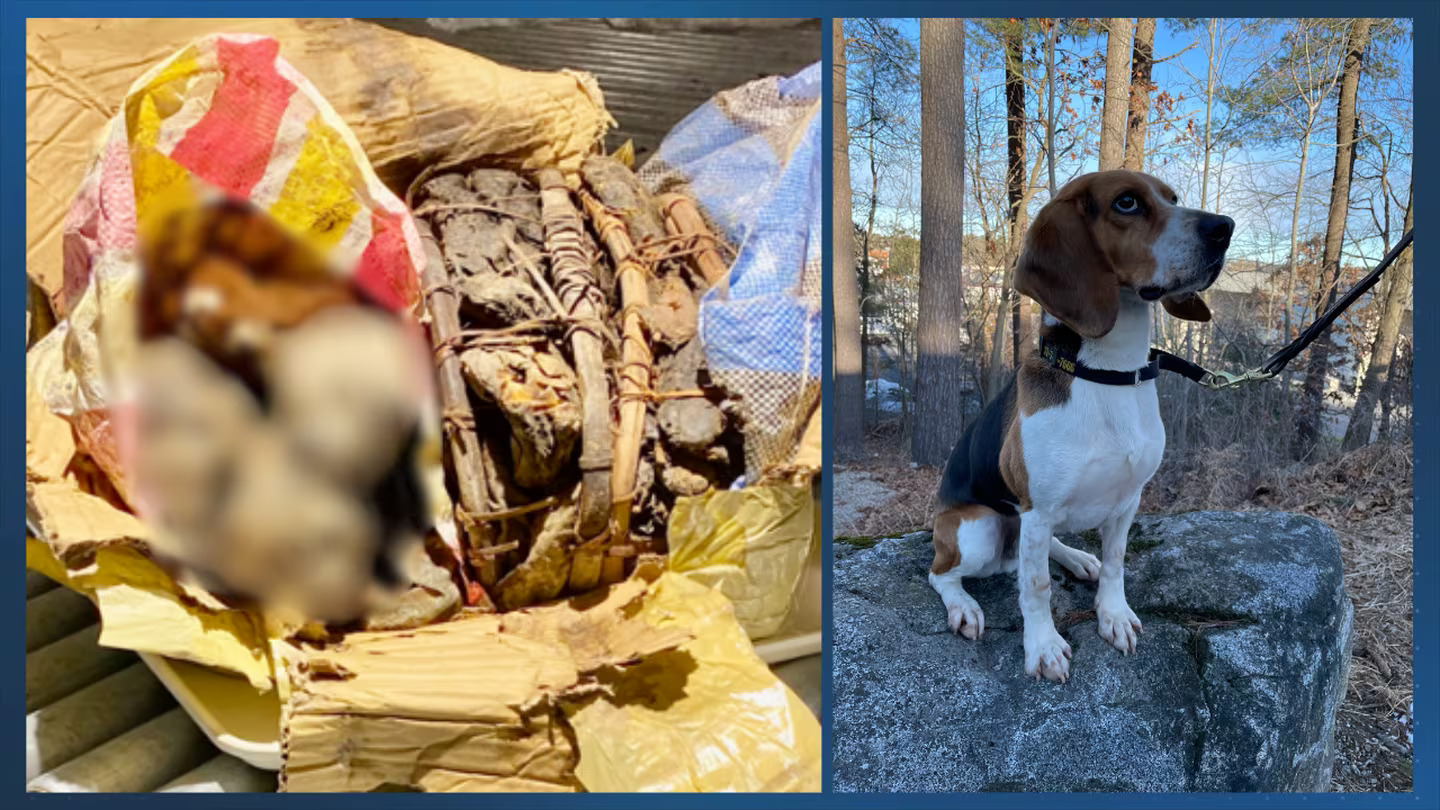CBP Dog Uncovers Mummified Monkeys In Passenger’s Luggage
A routine inspection at a Boston airport took a bizarre turn when a Customs and Border Protection (CBP) dog detected something unusual in a passenger's luggage. What started as a typical security check quickly escalated into a peculiar discovery of mummified monkeys as the CBP dog uncovers mummified monkeys in passenger’s luggage shedding light on the illicit trade in exotic wildlife and the challenges faced by authorities in combating such smuggling operations.
Author:Raven NoirReviewer:Morgan MaverickFeb 22, 20243.4K Shares114.3K Views

A routine inspection at a Boston airport took a bizarre turn when a Customs and Border Protection (CBP) dog detected something unusual in a passenger's luggage. What started as a typical security check quickly escalated into a peculiar discovery of mummified monkeys as the CBP dog uncovers mummified monkeys in passenger’s luggageshedding light on the illicit trade in exotic wildlife and the challenges faced by authorities in combating such smuggling operations.
During a routine screening process, a highly trained CBP dog uncovers mummified monkeys in passenger’s luggage. Upon closer inspection, authorities were astonished to find several mummified monkeys concealed within the traveler's belongings, raising questions about the origin and purpose of these macabre artifacts.
The passenger said that the luggage included dried fish upon returning from a trip to the Democratic Republic of the Congo, but upon inspection at Boston Logan Airport, officials found four dead and dehydrated monkeys. According to Ryan Bissette, a CPB spokesman, the tourist claimed to have brought the monkeys into the country for personal use on Sunday.
Because of the risk of disease, eating raw or minimally processed wild animal meat, sometimes known as "bushmeat," is prohibited in the United States.
According to Julio Caravia, the port director for Customs and Border Protection in the area:
“„The potential dangers posed by bringing bushmeat into the United States are real. Bushmeat can carry germs that can cause illness, including the Ebola virus.- Julio Caravia
Although the incident occurred last month, word of it broke on Friday.
The U.S. Centers for Disease Control and Prevention designated the nearly 9 pounds (4 kilograms) of bushmeat for destruction, Bissette said on Sunday, even though no charges had been brought. All of the luggage had been seized.
The discovery of mummified monkeys highlights the clandestine trade in exotic wildlife, a lucrative but illegal industry driven by demand for rare and endangered species. Smugglers exploit vulnerable ecosystems and endangered animal populations, subjecting them to exploitation and cruelty for profit.
Bushmeat smuggling, which involves the illegal transportation of wild animals and their products, poses significant threats to biodiversity, public health, and animal welfare. Mummified monkeys are often sought after for their perceived medicinal or spiritual properties, fueling demand in underground markets.
CBP and other law enforcement agencies face significant challenges in detecting and intercepting wildlife smuggling operations. Smugglers employ sophisticated tactics to evade detection, including disguising contraband within legitimate cargo and exploiting regulatory loopholes.
The discovery of mummified monkeys raises important legal and ethical questions regarding the treatment of wildlife and the responsibility of individuals and nations to protect endangered species. Efforts to combat wildlife trafficking require international cooperation, robust enforcement measures, and public awareness campaigns.
In response to incidents of wildlife smuggling, authorities must hold perpetrators accountable and impose meaningful penalties to deter future offenses. Enhanced surveillance, intelligence-sharing partnerships, and targeted enforcement actions are essential to disrupt illicit wildlife trade networks.
Safeguarding biodiversity and preserving fragile ecosystems necessitate comprehensive conservation strategies and sustainable management practices. Public education and community engagement are vital in fostering appreciation for wildlife and promoting responsible stewardship of natural resources.
Conclusion
CBP dog uncovers mummified monkeys in passenger’s luggage. The discovery of mummified monkeys in a passenger's luggage underscores the urgent need to address the scourge of wildlife trafficking and protect vulnerable species from exploitation and extinction. By strengthening enforcement efforts, enhancing international collaboration, and raising awareness about the consequences of wildlife crime, we can work together to safeguard our planet's precious biodiversity for future generations.
Jump to

Raven Noir
Author
Raven Noir is a captivating and enigmatic news reporter who unravels mysteries with a relentless pursuit of truth. Possessing an insatiable curiosity and an astute mind, Raven delves into the depths of complex stories, unearthing secrets that lie beneath the surface. With a masterful grasp of deduction and observation, Raven stands as a beacon of fearless investigation.
In the realm of journalism, Raven is known for his enigmatic presence, drawing people in with an aura of intrigue. Driven by an unwavering passion for unveiling the truth, Raven Noir continues to shed light on the darkest corners of society. Through captivating storytelling and unwavering determination, he challenges conventions and uncovers enigmatic secrets that lie just beyond the surface.

Morgan Maverick
Reviewer
Morgan Maverick is an unorthodox news reporter driven by an insatiable hunger for the truth. Fearless and unconventional, he uncovers hidden narratives that lie beneath the surface, transforming each news piece into a masterpiece of gritty authenticity. With a dedication that goes beyond the boundaries of conventional journalism, Morgan fearlessly explores the fringes of society, giving voice to the marginalized and shedding light on the darkest corners.
His raw and unfiltered reporting style challenges established norms, capturing the essence of humanity in its rawest form. Morgan Maverick stands as a beacon of truth, fearlessly pushing boundaries and inspiring others to question, dig deeper, and recognize the transformative power of journalism.
Latest Articles
Popular Articles